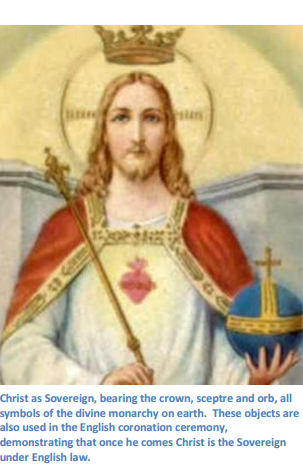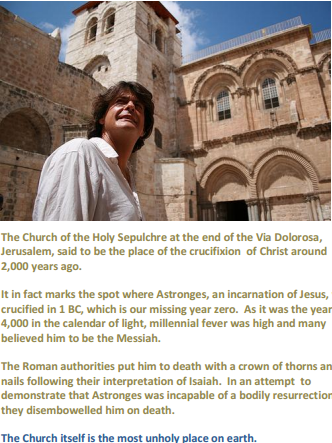The Heir of all Things
Vicarius Deus
Verily, verily, I say unto you, The hour is coming, and now is, when the dead shall hear the voice of the Son of God: and they that hear shall live. For as the Father hath life in himself; so hath he given to the Son to have life in himself; And hath given him authority to execute judgment also, because he is the Son of man.
John 5:24-27
On these two commandments hang all the Law and the prophets.
Matthew 22:34-40
Jesus Christ: ‘Think not that I am come to destroy the Law, or the prophets: I am not come to destroy, but to fulfil [1].
Matthew 5:17
In the past God spoke to our forefathers through the prophets at many times and in various ways, but in these last days he has spoken to us by his Son, whom he appointed heir of all things, and through whom he made the universe.
Hebrews 1:1-2, NIV
Now the promises were pronounced to Abraham and to his ‘issue’. It does not say ‘issues’ in the plural, but in the singular, ‘and ‘to your issue’; and the issue intended is Christ.
Galatians 3:16-17, New English Bible
‘For the Son of man is Lord even of the Sabbath day’.
Matthew 12:8
And He said to them, ‘The Son of Man is also Lord of the Sabbath’.
Luke 6:5
‘All of the Law’ hangs on the two commandments to love God and man. But why on the ‘prophets’ as well? The Prophets of the Bible tell a common story about the arrival of the Chosen One of God referred to as Jesus Christ in the New Testament — ‘Yeshua Messiach’ in Hebrew — and ‘Shiloh’ in the Old Testament. The concept of a Chosen One is not though limited to the Bible. Buddhism, Islam, Zoroastrianism, Confucianism and certain ‘pagan’ creeds among others envisage the arrival of God’s Chosen One on earth in the End Times or ‘End of Days’.
The Sovereign under the Law
The staff shall not depart from Yehuda [Judah], nor the sceptre from between his feet, until Shiloh comes, and the obedience of the people be his.
Alternative Jewish translation from Bereshit or Genesis 49:10
‘Think not that I am come to destroy the Law, or the prophets: I am not come to destroy, but to fulfill’
Matthew 5:17
All the Law and the Prophets hang on these two commandments
Matthew 22:40
God, and not man, makes the heir [2].
Maxim of Law
Matthew 5:17 and 22:40 quoted above demonstrate a direct relationship between the Law and the Chosen One or Christ, if any were needed. It is after all axiomatic that your first commandment duty to God, includes a duty to the One whom God has chosen to represent him on earth. At the same time, just about every version of the oath is sworn to the sovereign and their ‘heirs’, which the Bible makes clear must in the first instance mean Jesus Christ as ‘the heir of all things’ [3] in other words the final heir who comes as part of the work in progress that is the making of the universe.The role of the Chosen One in relation to the father and man’s duty to the Chosen One is set out in the following passage:
For the Father judgeth no man, but hath committed all judgment unto the Son: That all men should honour the Son, even as they honour the Father. He that honoureth not the Son honoureth not the Father which hath sent him. Verily, verily, I say unto you, He that heareth my word, and believeth on him that sent me, hath everlasting life, and shall not come into condemnation; but is passed from death unto life.
John 5:22-23
Those belonging to the Christian faith believe that Jesus Christ came around 2,000 years ago — appearing in what was then known as Judea but is now known as the state of Israel — while other faiths, including Judaism and Islam, believe the Messiah is yet to come [4] .
The Bible and other versions of the Prophecy foretell the coming of a Chosen One who will usher in an age of love, peace and enlightenment. The last two thousand years of history record the exact opposite of this: they are a testament to man’s inhumanity to his fellow man (all carried out with the free will of individual men and women. God has never murdered anyone. Nor has the Bible, despite the accusations of intellectuals and atheists).
In recent years, we have experienced man’s darkest hour, an age characterized by greed, inequality, injustice, exploitation and the rape of Mother Earth, for which man not God is responsible. Any reasonable man would be obliged to conclude that the age of peace – referred to also in the Bible as the Seventh Day, the Age of the Messiah, when God rests – did not begin two thousand years ago – and therefore there was no messiah at that time. This view is supported by evidence or rather the lack of it [5].
We apparently have no contemporaneous accounts of the mission of the Chosen One. (Scholars agree the Gospels were written at least decades later). This is supposed to be the greatest event in the history of man, yet contemporary historians ignore this supposed coming. Even if the claimant weren’t the Christ, you would think that someone somewhere would record the fact that a claimant had led a rebellion against the Romans and convinced a number of others to follow his teachings.
It was in fact, the word of the Gospels – largely written by John the Divine [6] — and the setting out of the Law, which brought down Rome some 400 years after the time Christians claim Christ carried out his mission. Even those who persist in believing that the Gospels record history have to acknowledge that the last book of the Bible, Revelation or the Apocalypse of St John, foretells the ‘return’ of the Christ in the End Times to usher in the new age.
Whether Christ is coming for the first time or returning is therefore an irrelevance. As the Chosen One of God and the ‘heir to all things’, he carries the highest authority of the Law when he does actually arrive and formally claim his birthright.
The Queen’s duty to the Sovereign
Then what of the law? It was added to make wrongdoing a legal offence. It was a temporary measure pending the arrival of the ‘issue’ to whom the promise was made.
Galatians 3:19, The New English Bible
The Bible makes it abundantly clear that law, small ‘l’, is legislation, a temporary measure introduced until the arrival of the ‘issue’, which from context can only be read in the first instance as ‘Christ’: The sovereign prior to the arrival of Christ, the Queen, has already acknowledged Christ’s Sovereignty. At her coronation she swore fealty to Christ by agreeing to maintain ‘the true profession of the Gospel’:
Archbishop: Will you to the utmost of your power maintain the Laws of God and the true profession of the Gospel?
Queen: All this I promise to do.
Although there are four Gospels in the New Testament recounting stories which often differ wildly in their detail, they are all mainly concerned with the arrival of the Christ, his mission and the Law. In English law, the monarch acts as a stand-in sovereign until the true heir or the Sovereign Christ arrives under the principal of the divine right of kings (or in his absence, of a queen). The monarch is inviolate in law, which means that you cannot take action in law against the divinely appointed sovereign. This aspect of the monarch’s position within law is recognised by the styling of every criminal action as ‘The Queen versus ….’.
After recognizing God’s authority, the Oath – be it the Oath of Allegiance, the Oath of Office or the Judicial Oath among others — recognises the monarch’s authority who in turn recognizes God’s authority and the authority of the Christ through her oath to maintain ‘the true profession of the Gospels’.
For the avoidance of doubt, the oath-taker swears his fidelity to the monarch, Queen Elizabeth II, not to the woman who bears that office, Elizabeth Windsor aka Saxe-Coburg Gotha Battenberg.
- When Christ comes, he is the heir to everything. Under the Law, everyone has a duty to the Christ.
The Sovereign’s right to Land and Property
In English law the monarch holds the allodial right to land and property and acts as the trustee for around £17billion of assets, which are therefore automatically inherited by Christ, the ‘heir of all things’. As we have already seen, allodial right – in this case coming from the God-given right of the heir of all things, Christ — takes precedence over ‘absolute’ title, despite the best efforts of the shysters who draft Black’s Law to cloud the issue.
It is also recorded in Hale’s writings on the Common Law:
That the Jurisdiction exercised in those Courts is derived from the Crown of England, and that the last Devolution is to the King, by Way of Appeal. […] The Common Laws of this Kingdom have ever obtain’d and retain’d the Superintendency over them [civil laws and statutes], and those Signa Superioritatis before-mentioned, for the Honour of the King and the Common Laws of England.
The History of the Common Law of England, Matthew Hale, 1713 edition
Under English law, the monarch’s sovereignty was never taken away. As we have already seen, the monarch has the authority over:
- the Royal Prerogative, the highest instrument of law.
- the Prime Minister and all other office holders, including judges, MPs, the armed forces and parliament, recognised in the oath to serve the Sovereign.
- parliamentary legislation, which cannot have any lawful basis whatsoever without assent from the Sovereign.
- public policy via the Privy Council.
- The BBC and a variety of other institutions governed by Royal Charter.
As defender of the faith, the monarch also acts as governor of the Church of England until Christ arrives. The Bible makes it clear that Christ is head of the church so his authority also extends over the Pope and the Catholic Church. Failure to observe the oath, once sworn, will lead in the first instance to charges of perjury and possibly sedition and treason, depending on circumstance. Once convicted under the Law, the penalties depend on the seriousness of the offence and are not limited as they are under the rules of equity.
- There can be no doubt that Jesus Christ is the Sovereign under the Law.
- And there is no evidence of his coming 2,000 years ago.
Footnotes
[1] The Greek word used also means to ‘complete’.
[2] See Romans 8:16
[3] Hebrews 1:2
[4] The Book of John makes it clear that ‘Christ’ and ‘Messiah’ are synonymous. They both mean ‘the anointed one’
[5] The only claim to a contemporary mention of Christ comes in Josephus’s History of the Jewish people. Scholars agree that the passage in question is a later interpolation.
[6] John the Divine aka John the Beloved (Apostle) aka John the Evangelist aka in some aspects John the Baptist. He was the incarnation of Jesus of the day. There is a clue in his name: John the Divine

